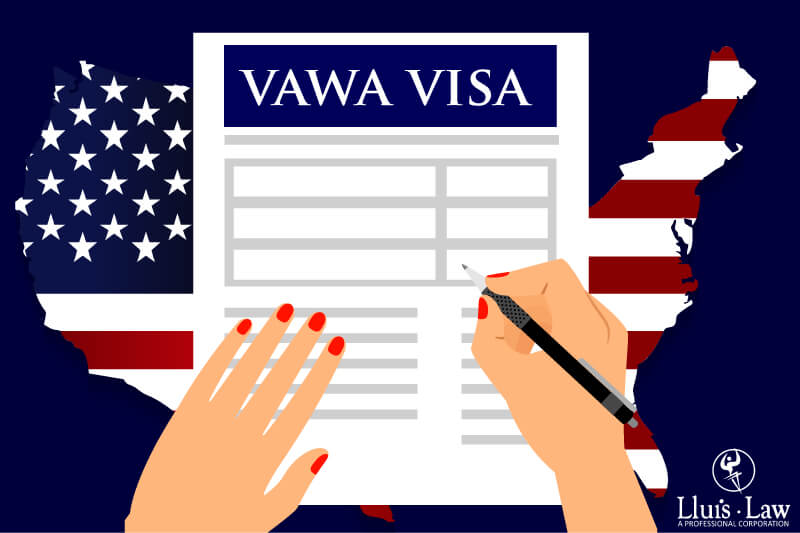Knowing what the VAWA visa is will allow you to understand how this resource protects victims of abuse in the United States.
At Lluis Law, our Los Angeles immigration lawyers can help you determine if you qualify and guide you through the process.
Call us today for a consultation and get the protection you deserve.
LATINOS WITH OVER 50 YEARS EXPERIENCE
Tell Us Your Case
Table of Contents
What is the VAWA visa and how does the program work in 2025?
VAWA is a law that allows certain immigrant victims of abuse in the US to obtain a Green Card without depending on their abuser.
This program was created as the Violence Against Women Act (VAWA) and is designed to:
- Spouses;
- Children; or
- Parents of US citizens or lawful permanent residents who have experienced abuse.

Typically, the immigration process requires a citizen or lawful permanent resident to file a petition for their family member.
However, VAWA allows victims of abuse to file a self-petition, preventing the abuser from controlling the process.
What do I need to show to be able to file a VAWA self-petition?
To file a VAWA self-petition, you must show:
- Relationship to the abuser: Being the spouse, child, or parent of a citizen or lawful permanent resident;
- Abuse: Having suffered physical aggression or extreme cruelty by the abusive family member; and
- Good moral character: This means meeting the standards required by immigration law.
Steps to file a VAWA self-petition
To file a VAWA self-petition we recommend you follow these steps:
1# Consult with an immigration lawyer
Find an experienced VAWA self-petition attorney to guide you through the process and ensure you present the best evidence possible.
2# Complete Form I-360
With the help of your attorney, complete and file Form I-360 along with other required documents.
3# Writing your personal statement
Tell your story in your own words, detailing the abuse you suffered and how it meets the requirements of VAWA.
4# Obtain corroborating statements
Work with mental health counselors or other professionals who can support your story with written statements.
5# Gather additional evidence
If you have medical, legal, or social services records that support your case, please include them. If you do not, our attorneys can explain why other sources of evidence are valid for your case.
6# Submit the application to USCIS
Once your paperwork is complete, submit it to USCIS for review.
7# Follow the process of your case
Stay in touch with your attorney to answer any additional requests.
Who may be eligible to apply for a VAWA visa?
The following individuals may be eligible to apply for a VAWA visa:
- Spouses: If you have been abused by your US citizen or lawful permanent resident spouse, you may apply for the visa. You may also include your child, if they have been abused by your spouse, as long as they are under 21 and unmarried.
- Parents: If you have been abused by a US citizen son or daughter, you may be able to apply for VAWA.
- Children: If you are an abused child, under the age of 21, and have been mistreated by your citizen or lawful permanent resident parent, you may apply for the visa. You may also include your children if you have any.
Note: Spouses must prove that their marriage was bona fide, meaning that they did not marry solely for immigration reasons. To do so, they must submit evidence such as personal statements, photographs and so on. USCIS does not require specific evidence, but must show that the intention was to build a life together.
What types of abuse can qualify for a VAWA self-petition?
Abuse that may qualify for VAWA includes:
- Physical violence;
- Psychological abuse;
- Economic control,
- Isolation; and
- Threats, even without direct aggression.
Note: You can review all examples of extreme cruelty in the USCIS Policy Manual or by consulting with our immigration attorneys.
Who is not eligible for VAWA?
Immigrants who do not qualify for VAWA are those who are deemed inadmissible under US immigration law.
For example, those with criminal records, immigration fraud or other serious violations.

Requirements to obtain a Green Card through VAWA
To obtain lawful permanent residence through VAWA you must meet certain requirements:
- Successfully submit Form I-485 to apply for adjustment of status.
- Be physically present in the US at the time of application.
- Be eligible for an immigrant visa and one will be available when you submit your petition and when USCIS makes a final decision.
- Not be subject to any adjustment of status restrictions.
- Be admissible for lawful permanent residence or qualify for a waiver of inadmissibility.
- That USCIS makes a favorable decision when considering your case.
Note: If you are a VAWA beneficiary, you can apply for lawful permanent residence regardless of how you entered the US or whether you had any immigration problems. Unlike in other cases, you are not subject to the restrictions that would normally prevent adjustment of status.
What documents do I need to submit to apply for a VAWA visa?
Among the documents you must submit are:
- Form I-360.
- Evidence of abuse, such as police reports or witness statements.
- Proof of your relationship to the abuser, such as a marriage or birth certificate.
- Proof of presence in the US such as bills or medical records.
Note: These are just a few examples of what you may need. To ensure your application is complete and appropriate, we recommend that you contact our attorneys.
How long does it take to obtain lawful permanent residence under VAWA?
The time to obtain a Green Card under VAWA varies. However, once the VAWA petition is approved, adjustment of status can take 6 to 12 months or longer.
It is important to keep your address up to date with USCIS while your case is pending. You can check the updated timelines on the USCIS website.
What happens after I file my VAWA visa self-petition?
Once your attorney submits the self-petition, USCIS will send you a receipt with the date it received your application.
You must provide a safe address where the abuser cannot access it and where you can receive correspondence without risk.
USCIS may request additional evidence, so it is important to keep an eye on the mail. If your application meets the preliminary requirements, USCIS may issue a document that allows you to access certain public benefits.
What happens after my VAWA visa application is approved?
Approval of your VAWA self-petition does not automatically grant you a Green Card. However, you may be eligible for one and, in some cases, obtain an employment authorization while your application is being processed.
What is the VAWA interview like?
USCIS will not interview you or ask you to testify about the abuse for your VAWA self-petition. The decision will be based solely on the written evidence you submit, so it is critical to provide sufficient proof of your eligibility.
If you apply for a Green Card, you may need to explain how the abuse affected your entry and exit from the country.
Am I protected from deportation while my VAWA self-petition is pending?
Unfortunately, filing a VAWA self-petition does not grant you legal status in the United States.
However, our immigration lawyers specializing in deportations will be able to help you in these cases.
What is cancellation of removal under VAWA visa?
VAWA cancellation of removal is an immigration relief that allows certain victims of abuse to stop their deportation proceedings and obtain a Green Card.
However, it is only available to those who are in deportation proceedings.
VAWA Visa FAQs

Can I legally work in the United States with a VAWA visa?
Under VAWA you can get an employment authorization, but not automatically. To do so, USCIS must approve your self-petition.
What other options do I have if I do not qualify for a VAWA visa?
If you do not qualify for a VAWA self-petition, you may be eligible for a U visa (for victims of certain crimes) or a T visa (for victims of human trafficking).
Can I file a VAWA self-petition from another country?
If eligible, you may file a VAWA self-petition from another country if you meet any of these conditions:
- The abuser is a US government employee or member of the military and the abuse occurred while you were living together abroad;
- The aggressor abused his son under the same circumstances;
- You currently live outside the US, but the abuse occurred while you were in the country; and
- Your abuser was your spouse and abused your child in the US, even though you now live abroad.
If you are still in the US and plan to leave before applying, consider gathering evidence before you leave, such as police reports, medical records and so on.
Can I file a VAWA self-petition if I have conditional permanent residence?
If you have conditional permanent residence, you can file a VAWA self-petition to remove the condition without needing your abusive spouse’s signature.
Normally, both spouses must file a joint petition to remove the condition. However, VAWA allows you to do so without involving the abuser.
Do I need to speak to an immigration attorney to apply for a VAWA visa?
You already know what the VAWA visa is and although it is not mandatory to speak with an attorney, it can be key to your application and in fact it is in most successful cases. If you believe you are eligible to be a self-petitioner, our immigration attorneys at Lluis Law can help you.
With over 50 years of combined experience, we are ready to guide you through the process and provide you with the legal support you need. Contact us today to schedule a confidential consultation and review your case.
LATINOS WITH OVER 50 YEARS EXPERIENCE
Tell Us Your Case



